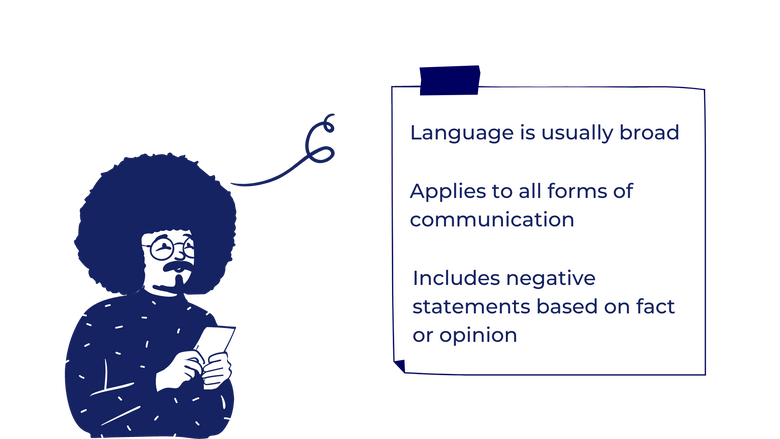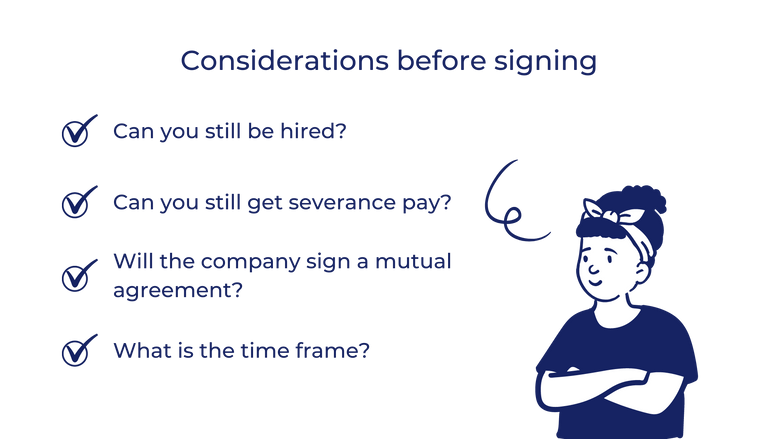Non-Disparagement Clauses: What You Need to Know
Before signing a non-disparagement clause, understand what that agreement means for you.
When you first join a company, or perhaps when you’re leaving one, you might be asked to sign a non-disparagement agreement. But just what is a non-disparagement clause? What exactly does it mean to disparage a company? And what will that mean for you legally?
The best course of action is to seek legal advice from an employment lawyer before you sign any contract, but it helps to have an understanding of what a non-disparagement clause actually refers to, and how it will affect you, either as a current or former employee of a company.
What is a non-disparagement clause?

Put simply, a non-disparagement clause prohibits you from making negative statements about or giving negative reviews of a company. Saying bad things about a company’s business products, services, or executive officers will land you in a sticky legal situation.
It’s difficult to prove that you bad-mouthed a company privately to a family member or friend, but with the advent of social media, it’s easy for an employer to tell if you’ve spread anything negative about their business on Twitter or LinkedIn.
Here are a few examples of non-disparagement provisions:
- Prohibiting employees from making degrading comments about the company
- Barring employees from making negative statements about the exectuvies
- Preventing employees from discussing non-compete agreements
When and where will you see a non-disparagement clause?

The two places you are most likely to see a non-disparagement clause are:
- In employment contracts upon your initial hiring, or
- In a severance agreement upon leaving a company, particularly if you are being laid off or fired.
It’s become common practice for many companies to require signing a non-disparagement clause as part of an employment agreement. Many businesses require these contracts up-front because the relationship between employee and employer is almost certainly positive.
It’s a little trickier when you are signing a non-disparagement clause upon leaving a company, especially if it is on bad terms. As a part of a settlement agreement, your former employer might make signing the clause a condition of receiving your severance payment.
What does a non-disparagement agreement look like?

The language of a non-disparagement clause will usually be broad, applying to all forms of communication, but especially the press or social media. It will also prohibit employees from making negative statements based on either fact or opinion, to anyone.
Every non-disparagement agreement will look a little different depending on various factors, but here is the legal language you should expect to see:
Executive shall not, at any time during the Term and thereafter, make statements or representations, or otherwise communicate, directly or indirectly, in writing, orally, or otherwise, or take any action which may, directly or indirectly, disparage the Bank or the Company or any of its subsidiaries or affiliates or their respective officers, directors, employees, advisors, businesses or reputations. Notwithstanding the foregoing, nothing in this Agreement shall preclude Executive from making truthful statements that are required by applicable law, regulation or legal process. (link here)
Should you sign?

Many factors can go into your decision whether or not to sign a non-disparagement agreement. Here are some of the most important considerations.
Can you still be hired? Some companies may rescind their job offer if you refuse to sign a disparagement provision. Find out if your company requires all of its employees to sign, and if the company is willing to change any language you’re uncomfortable with.
Can you still get severance pay? If your separation agreement requires you to sign in order to get severance payment and benefits, you will need to weigh how much your severance means to you versus any negative experiences with your former employer that you might want to make public.
Will the company sign a mutual agreement? Sometimes, a company will agree to a reciprocal disparagement provision. If they agree to this then, by law, they also cannot make negative statements about their former employees. This could be of particular importance to you if you are being terminated and need to find another job.
What is the time frame? Before you sign, make sure that the effective date of the disparagement provision only covers the future. If the effective date is in the past, that’s a major problem, as you should not be held responsible for your conduct previous to signing. Non-disparagement agreements must exclude bad things you might have said about the company in the past.
What happens if you break your agreement?

If you break a non-disparagement clause, your employer or former employer can take legal action against you. You can be sued, which typically includes forcing you to back the settlement proceeds, and you may even have to pay for any damages the company can prove that you caused.
Since financial damages can be tricky to prove, some companies have a liquidated damages clause, where the cost of damage depends on how many times you violated the agreement. If you disparaged them on Facebook, Twitter, and LinkedIn, that’s three different disparagements.
It may be difficult to build a court case around you privately complaining to your mother or best friend, but it’s still a breach of your contract. Make sure that if you do need to let off steam, it’s in private and with people you trust, and don’t post it online. The Court has already rejected a first amendment defense, as the right to free speech does not apply within a private company.
Exceptions to the rule
Government investigations. You can disclose negative information about your company to government agencies that are conducting an investigation. If the Equal Employment Opportunity Commission is investigating discrimination at your current or former place of employment, you are allowed to speak freely to them. The same applies if the company is being investigated by the FDA or EPA for breaking regulations.
Many companies have required that disparagement clauses must carve out an exception for filing charges of your own with these government agencies, or to give truthful testimony in a legal process. The law ensures that an employee has the right to participate in or file charges in investigations, so look for that language in the separation agreements between you and your company.
However, protection from the Equal Employment Opportunity Commission can only extend so far, as some employers may restrict their former employees’ right to recovery. Just because a company cannot stop you from filing a charge doesn’t mean they cannot prevent you from receiving victim-specific relief from the EEOC.
Legitimate whistleblowers. There can also be cases made for legitimate whistleblowers on a case-by-case basis; particularly for hot-button issues like sexual harassment and other unlawful conduct. Non-disclosure and forced arbitration clauses are coming under more scrutiny, and in some states, laws have been passed to restrict or prohibit them. Keep an eye out for any laws that your state passes in this area.
Workers compensation. You are also legally allowed to disparage your company if you need to file a worker’s compensation claim after being hurt in your workplace. If you are ill or injured due to a company’s bad practices, you are permitted to explain the situation truthfully without being on the receiving end of any legal action.
Talk to your attorney

Signing or not signing a non-disparagement clause is a personal decision, where you must weigh your own risks and rewards. However, it always helps to talk to a professional, and there are lawyers who specialize in employment law and workplace fairness.
Even if you don’t think you will ever be in a situation where you might disparage your employer publicly, it’s a good idea to have a grasp on the basics of what you’re agreeing to when you sign the paperwork.
Ideally for both employers and employees, you will never have to worry about it. However, it is a binding legal agreement, and you should know exactly what it is you’re signing before you put pen to paper.
👉 Read Next: Job Offer Letter Legal Terms to Look Out For
The information provided herein is for general informational purposes only and is not intended to provide tax, legal, or investment advice and should not be construed as an offer to sell, a solicitation of an offer to buy, or a recommendation of any security by Candor, its employees and affiliates, or any third-party. Any expressions of opinion or assumptions are for illustrative purposes only and are subject to change without notice. Past performance is not a guarantee of future results and the opinions presented herein should not be viewed as an indicator of future performance. Investing in securities involves risk. Loss of principal is possible.
Third-party data has been obtained from sources we believe to be reliable; however, its accuracy, completeness, or reliability cannot be guaranteed. Candor does not receive compensation to promote or discuss any particular Company; however, Candor, its employees and affiliates, and/or its clients may hold positions in securities of the Companies discussed.
